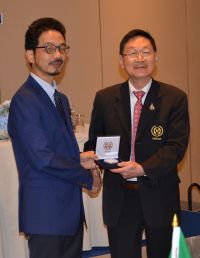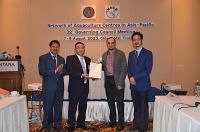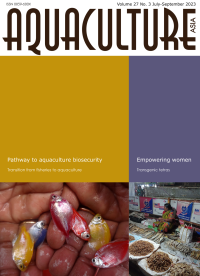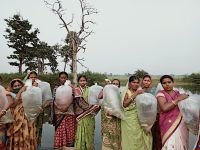A highlight of the 32nd Governing Council Meeting in Chiang Mai was the award of the Aziz-Ul Haq Rural Development Medal to NACA by the Centre on Integrated Rural Development for Asia and the Pacific (CIRDAP). The award was presented by Dr Cherdsak Virapat, Director General of CIRDAP on behalf of the CIRDAP Governing Council, which had determined to confer the award at a Special Session of the Executive Committee on 25 May.
The award was granted to NACA “…for its remarkable contributions to rural development through sustainable aquaculture and aquatic resource management programs, policy dialogue and regional cooperation in Asia and the Pacific region and for unwavering support to the CIRDAP mission to promote regional sustainable aquaculture development and resilience to climate challenges.”
Chiang Mai, Thailand: The 32nd Governing Council today unanimously approved the Kingdom of Saudi Arabia’s membership of NACA, bringing the total number of member states to 20. Mr. Tanes Poomtong, Chair of the NACA Governing Council said, “I am delighted to welcome the Kingdom of Saudi Arabia to the NACA family. Our members believe that Saudi Arabia’s membership will bring substantial benefits to NACA, opening new opportunities for technical exchange and sharing of experience for the mutual benefit of all.”
Dr. Huang Jie, Director General of NACA said “Saudi Arabian membership will bring diversity, new ideas and thinking about how aquaculture can develop under different conditions. The innovative approaches to development in the Kingdom provide are instructive for the transformation of Asian aquaculture and provide a showcase of what should be possible in the region.”
With the implementation of the new aquatic animal disease reporting in the Asia Pacific region from January 2021, and in lieu of the published QAAD Reports (last issue published was 4th quarter of 2020), NACA is publishing reported aquatic animal diseases submitted by countries in the Asia-Pacific region. This report covers the first quarter of 2023 and the original and updated reports can be accessed at the Quarterly Aquatic Animal Disease page.
In this issue:
- Pathway to aquaculture biosecurity: Mitigating risks, managing progressively and engaging the value chain
- Important considerations for feed and feeding management during Indian catfish culture
- A transitional journey from fisheries to aquaculture in Moyna
- Colour widow tetra: A new and highly preferred aquarium fish in West Bengal
- Expanding the horizon of aquaculture through women's empowerment
- NACA Newsletter
The concept of “empowerment” was introduced at the International Women’s conference in 1985 at Nairobi, which defined empowerment as a “redistribution of social power and control of resources in favour of women”. In recent years the development of women has emphasised providing equal opportunities to women by removing gender bias, empowering, and creating self-reliance among them. Empowerment of women and gender equality is recognised globally as a key element to achieve progress in all areas. Globally, the role of women and the need to consider gender issues in aquaculture development was first recognised by the FAO-NORAD sponsored workshop on “Women in Aquaculture” in 1987.



